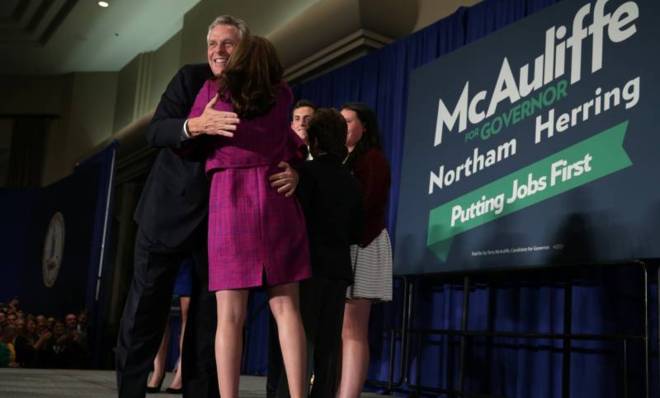What politicians still don't understand about women voters
Terry McAuliffe's victory in Virginia proves that women have political interests beyond their ovaries

In the aftermath of the hotly contested Virginia gubernatorial election, women got a lot of the credit for Democrat Terry McAuliffe's victory. Just before voting, a Washington Post headline ran, "Virginia women are poised to send a strong message," and at MSNBC, a story was titled, "Women's votes help Terry McAuliffe eke out a win."
But the truth is, women didn't tip the scales that drastically.
While more women did vote for McAuliffe than Attorney General Ken Cuccinelli, it was not a landslide. Fifty one percent of women voted for McAuliffe, and 42 percent voted for Cuccinelli. To put that breakdown in context, it would be more accurate to say that unmarried voters gave McAuliffe his victory, since 62 percent of them voted for him and just 29 percent for Cuccinelli.
The Week
Escape your echo chamber. Get the facts behind the news, plus analysis from multiple perspectives.

Sign up for The Week's Free Newsletters
From our morning news briefing to a weekly Good News Newsletter, get the best of The Week delivered directly to your inbox.
From our morning news briefing to a weekly Good News Newsletter, get the best of The Week delivered directly to your inbox.
Moreover, when you examine the subgroups of female voters, it's clear that McAuliffe didn't always win a majority. To put it bluntly, "a lot of white women voted for anti-choice Ken Cuccinelli," wrote Kat Stoeffel at New York. Fifty-four percent of them, in fact, with a measly 38 percent swinging in McAuliffe's favor. Cuccinelli also won married women by a 51-42 percent margin.
Cuccinelli's decent support among women is especially interesting because he is as anti-reproductive rights as they come. Considering that he once compared abortion to slavery and refused to endorse the Violence Against Women Act (which helps combat domestic violence), he arguably held his own among female voters.
The McAuliffe campaign pounded him on these topics, but only to marginal avail. So what does this mean?
Well, it suggests that women are not as universally driven by reproductive rights and female-focused topics as Democratic politicians believe. James Hohmann at Politico wrote that the results "raise questions about whether women are starting to tune out the 'war on women' messaging and whether apocalyptic suggestions that Cuccinelli would try to ban common forms of birth control were effective at driving women to the polls."
A free daily email with the biggest news stories of the day – and the best features from TheWeek.com
The voting data supports this theory. McAuliffe won 59 percent of the electorate that said abortion was the most important issue, but that was only 20 percent of the voters. Speaking only to reproductive rights is not enough to win an election — or for that matter, a majority of certain women. Even a far-right candidate like Cuccinelli managed to earn about the same percentage of female votes as moderate Mitt Romney did in Virginia this past presidential election.
Furthermore, the starkly different voting patterns of women when separated by race and marital status emphasize that politicians are no longer able to generalize women as a single voting bloc.
Since female voters outnumber their male counterparts, they are considered the most highly prized voting demographic by politicians. But the latest data from Virginia shows that women are a nuanced group with various positions, making it clear that many of our elected leaders still don't know what women want.
Emily Shire is chief researcher for The Week magazine. She has written about pop culture, religion, and women and gender issues at publications including Slate, The Forward, and Jewcy.
-
 31 political cartoons for January 2026
31 political cartoons for January 2026Cartoons Editorial cartoonists take on Donald Trump, ICE, the World Economic Forum in Davos, Greenland and more
-
 Political cartoons for January 31
Political cartoons for January 31Cartoons Saturday's political cartoons include congressional spin, Obamacare subsidies, and more
-
 Syria’s Kurds: abandoned by their US ally
Syria’s Kurds: abandoned by their US allyTalking Point Ahmed al-Sharaa’s lightning offensive against Syrian Kurdistan belies his promise to respect the country’s ethnic minorities
-
 The billionaires’ wealth tax: a catastrophe for California?
The billionaires’ wealth tax: a catastrophe for California?Talking Point Peter Thiel and Larry Page preparing to change state residency
-
 Bari Weiss’ ‘60 Minutes’ scandal is about more than one report
Bari Weiss’ ‘60 Minutes’ scandal is about more than one reportIN THE SPOTLIGHT By blocking an approved segment on a controversial prison holding US deportees in El Salvador, the editor-in-chief of CBS News has become the main story
-
 Has Zohran Mamdani shown the Democrats how to win again?
Has Zohran Mamdani shown the Democrats how to win again?Today’s Big Question New York City mayoral election touted as victory for left-wing populists but moderate centrist wins elsewhere present more complex path for Democratic Party
-
 Millions turn out for anti-Trump ‘No Kings’ rallies
Millions turn out for anti-Trump ‘No Kings’ ralliesSpeed Read An estimated 7 million people participated, 2 million more than at the first ‘No Kings’ protest in June
-
 Ghislaine Maxwell: angling for a Trump pardon
Ghislaine Maxwell: angling for a Trump pardonTalking Point Convicted sex trafficker's testimony could shed new light on president's links to Jeffrey Epstein
-
 The last words and final moments of 40 presidents
The last words and final moments of 40 presidentsThe Explainer Some are eloquent quotes worthy of the holders of the highest office in the nation, and others... aren't
-
 The JFK files: the truth at last?
The JFK files: the truth at last?In The Spotlight More than 64,000 previously classified documents relating the 1963 assassination of John F. Kennedy have been released by the Trump administration
-
 'Seriously, not literally': how should the world take Donald Trump?
'Seriously, not literally': how should the world take Donald Trump?Today's big question White House rhetoric and reality look likely to become increasingly blurred